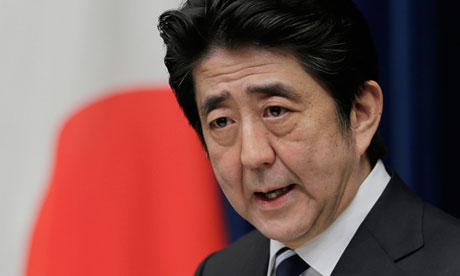
The Japanese prime minister, Shinzo Abe, has given ambiguous messages on how Japan should view the war. Photograph: Itsuo Inouye/AP
A court in South Korea has ordered a Japanese steelmaker to pay more than ?230,000 in compensation to four Korean citizens who said the firm used them as forced labour during the second world war.
Wednesday's ruling by the Seoul high court ? the first of its kind in South Korea or Japan ? comes amid heightened bilateral tensions over territory and conflicting interpretations of Japan's 1910-45 occupation of the Korean peninsula.
The court ordered Nippon Steel and Sumitomo Metal to pay 100 million Korean won (?58,500) to each of the four plaintiffs for unpaid salaries and psychological distress.
The steelmaker had engaged in "crimes against humanity by joining the Japanese government in mobilising forced labour for the sake of the war of aggression", the court said in its ruling.
Nippon Steel, which merged with Sumitomo Metal Industries last year to become the world's second biggest steelmaker, had argued that it was no longer the same entity that had employed Korean workers during the war.
The same plaintiffs, one of whom is 90, had previously sought redress through a court in the Japanese city of Osaka in 1997, but their claim was rejected on the grounds that Nippon Steel was not responsible for the firm's actions during the war.
Japanese firms are occasionally targeted by Korean and Chinese workers seeking damages for their time as forced labourers, but Japan insists that all compensation claims involving Korean citizens were settled when the countries restored diplomatic ties in 1965. At that time, Japan paid South Korea a lump sum of $500m.
Nippon Steel said it would appeal against the decision. "We deeply regret this unjustified ruling, which goes against the 1965 Japan-Korea claims settlement agreement ? a formal agreement between nations ? that completely and finally resolved such issues as forced labour," it said in a statement.
"We will swiftly appeal to the supreme court of Korea and hope to make clear the legitimacy of our position."
The Japanese government repeated its contention that wartime compensation claims had been settled "completely and finally" almost half a century ago.
The chief cabinet secretary, Yoshihide Suga, said officials were still examining the ruling, but said Japan could not accept it if it was not compatible with Japan's stance on reparations. "In that case, we will co-operate with the company to take appropriate action based on the government's stance."
Shin Chan-soo, one of the plaintiffs involved in the 16-year legal battle, said he had been taken in 1941 to work at a steel mill in Osaka run by Nippon Steel ? then named Japan Iron and Steel ? having been promised a living wage and the chance to gain experience.
He claimed he had been paid a pittance during his two years in Osaka.
"We have fought for months and years," Shin, 86, said after the ruling. "I feel great. We kept losing in lawsuits in Japan but now back in Korea, we won."
Japan is believed to have used about 780,000 Korean forced labourers during its 35-year colonial rule of the peninsula. That figure does not include tens of thousands of women, mainly Korean, who were forced to work in Japanese military brothels during the same period.
South Korean government data show that 299 existing Japanese companies used forced Korean labour before and during the war, the Yonhap news agency reported.
Source: http://www.guardian.co.uk/world/2013/jul/11/south-korea-court-japan
nike nfl uniforms ben and jerrys free cone day tornado in dallas texas the island president the maldives harper lee mega millions numbers
No comments:
Post a Comment
Note: Only a member of this blog may post a comment.